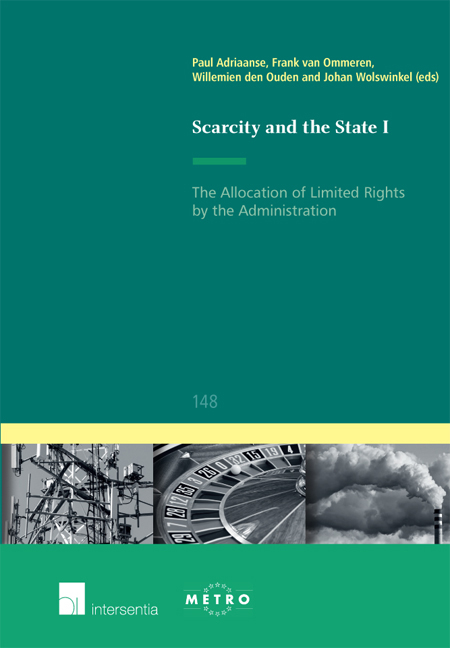Book contents
- Frontmatter
- Foreword
- Editors’ Preface
- Contents
- Part I General Perspectives
- Part II Eu Law Perspectives
- Chapter 6 Requirements under EU Law on the Allocation of Scarce European Subsidies
- Chapter 7 Τhe Allocation of Limited Authorisations under EU Internal Market Rules
- Chapter 8 The Need for Optimal Choice: Exploring a Hierarchy between Allocation Procedures for Limited Authorisations under EU Law
- Chapter 9 The Influence of EU State Aid Law on the Allocation of Limited Rights by National Authorities
- Chapter 10 Allocation of Limited Rights from a European Public Procurement Law Perspective
- Chapter 11 The Allocation of Limited Licences by the Administration – Requirements under the European Fundamental Right to Property
- Part III Comparative Law Perspectives
- List of Contributors
- Ius Commune Europaeum
Chapter 10 - Allocation of Limited Rights from a European Public Procurement Law Perspective
from Part II - Eu Law Perspectives
Published online by Cambridge University Press: 22 September 2018
- Frontmatter
- Foreword
- Editors’ Preface
- Contents
- Part I General Perspectives
- Part II Eu Law Perspectives
- Chapter 6 Requirements under EU Law on the Allocation of Scarce European Subsidies
- Chapter 7 Τhe Allocation of Limited Authorisations under EU Internal Market Rules
- Chapter 8 The Need for Optimal Choice: Exploring a Hierarchy between Allocation Procedures for Limited Authorisations under EU Law
- Chapter 9 The Influence of EU State Aid Law on the Allocation of Limited Rights by National Authorities
- Chapter 10 Allocation of Limited Rights from a European Public Procurement Law Perspective
- Chapter 11 The Allocation of Limited Licences by the Administration – Requirements under the European Fundamental Right to Property
- Part III Comparative Law Perspectives
- List of Contributors
- Ius Commune Europaeum
Summary
Introduction
This contribution departs from the assumption that the allocation of limited (public) rights in the EU and its Member States is in need of a consistent and general legal theory. The editors of this book assume that inspiration for such an approach may be drawn from the phenomenon of public procurement and its EU regulation. The question dealt with in this contribution is whether and to what extent this is indeed possible. In order to answer that question, and for the purpose of a better understanding of the subject matter, I will first briefly explain what ‘public procurement’ is and how it is generally being organised having regard to both the objectives that can be pursued with it, and the interests that can be affected by it (Section 2). This will provide a basis to answer the question what ‘EU public procurement law’ is, what type of decisions in an ordinary public procurement process it seeks to regulate and, having regard to its objectives, what the content of the regulation in essence is (Section 3). The information gathered in Sections 2 and 3 will thereupon be considered in order to determine whether and to what extent public procurement and its regulation can serve as a source of inspiration for a consistent and general legal theory on the allocation of limited rights. The analysis will start by making some general comments on the position and relevance that the editors have granted to both public procurement and its regulation in this book (Section 4), having regard to their threefold approach of the subject matter of the allocation of limited rights: a conceptual approach (definitions and characteristics), a top-down approach (EU law perspectives) and a bottom-up approach (comparative law perspectives). Subsequently, this contribution will analyse what probably can – and cannot – be learned from public procurement and its regulatory framework with a view to the development of a consistent and general legal theory on the allocation of limited rights, having regard to public procurement's generic and particular characteristics, objectives, interests involved, and organisation (Section 5). The analysis will deal with issues that have been selected and organised according to the following distinction helpfully provided by the editors: (i) the object of allocation (limited rights), (ii) allocation procedures, and (iii) their legal form.
- Type
- Chapter
- Information
- Scarcity and the StateThe Allocation of Limited Rights by the Administration, pp. 239 - 276Publisher: IntersentiaPrint publication year: 2016

